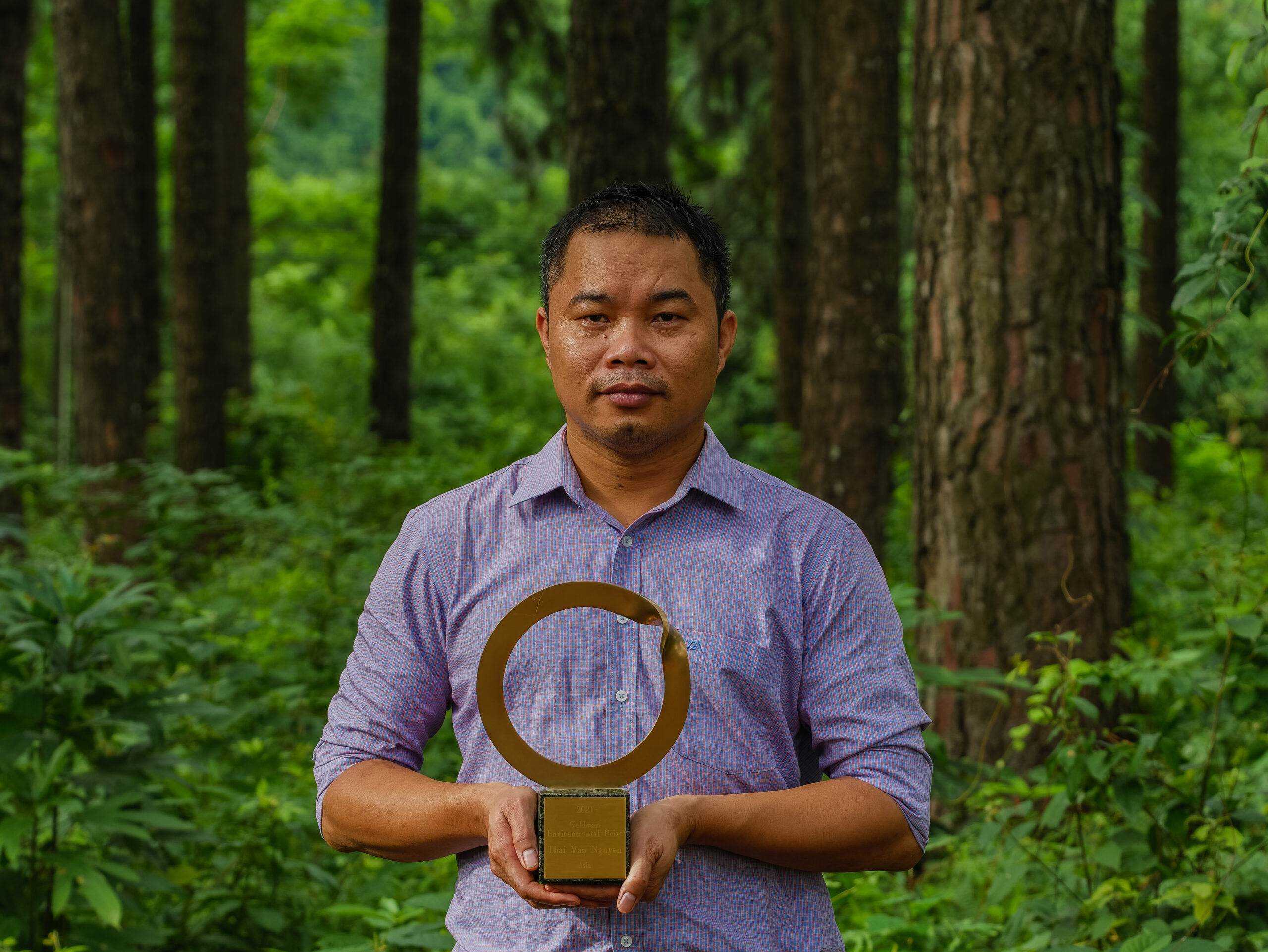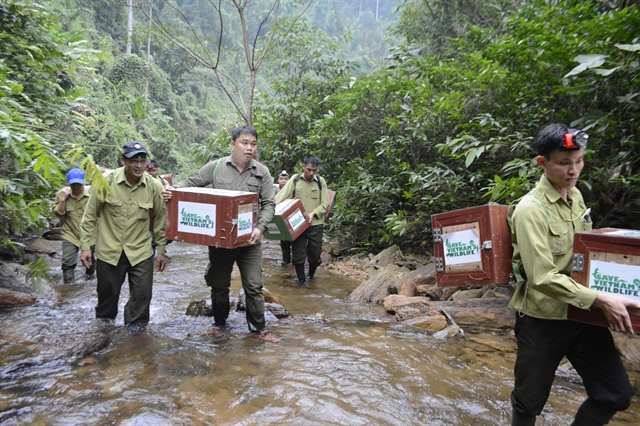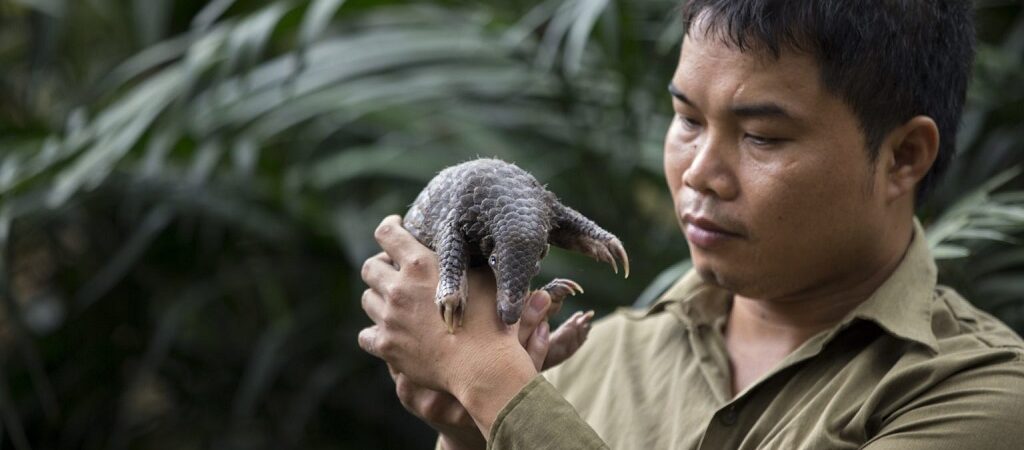Save Vietnam’s Wildlife is Shire Oak International’s direct partner in wildlife conservation and anti-poaching in Vietnam. Currently, Shire Oak International is carrying out sponsorship and media support activities to enhance the effectiveness of the campaign.
On June 15, the world’s largest environmental award, Goldman Environmental Prize 2021, which is likened to the “Green Nobel” award, was named a Vietnamese pangolin conservationist. That is Mr. Nguyen Van Thai, Director of the Center for Wildlife Conservation in Vietnam (Save Vietnam’s Wildlife-SVW) with an effort to save the pangolin species from extinction.
The second Vietnamese to receive the prestigious environmental award
Nguyen Van Thai is one of six people in the world and the first Vietnamese conservationist in Vietnam named on the list to receive the Goldman Environmental Prize in 2021.

The award is a recognition of the continuous contributions and efforts of Mr. Nguyen Van Thai and SVW over the past seven years in wildlife conservation. The other five winners of this year are Gloria Majiga-Kamoto (Malawi); Maida Bilal (Bosnia and Herzegovina); Kimiko Hirata (Japan); Sharon Lavigne (USA); and Liz Chicaje Churay (Peru). The award was founded in 1989 by American philanthropists Richard and Rhoda Goldman.
Each year, this $200,000 prize (nearly 5 billion Vietnamese Dong) is presented to only six outstanding individuals representing the Geographic regions: Africa, Asia, Europe, archipelagos and island nations, North America, South and Central America.
The Goldman Prize is regarded as the “Green Nobel” in the field of environment not only because of the fierce competition but also because of the international recognition for the achievements and dedication of individuals who are environmental leaders around the world.
The award is awarded to only six outstanding individuals each year, “reflecting the powerful impact that one person can have on many people” and especially contributing to inspiring the community in improving the environment, preserving the natural ecosystems on Earth.
As of 2020, the award has been handed to more than 200 individuals (87 of whom are women) from more than 90 countries around the world. Nguyen Van Thai is the first Vietnamese conservationist and the second Vietnamese to receive the award in the more than 30-year history of this Prize. The first Vietnamese to receive the award was Ms. Nguy Thi Khanh, Director of GreenID in 2018.
Honoring the guardian of pangolins
Pangolins are poached and trafficked more than any other mammal in the world, three out of four Asian pangolin species are critically endangered. An estimated 1 million pangolins have been poached in the past decade, mainly to supply the market with pangolin scales that many blindly believe can cure diseases.
In Vietnam, many pangolins are poached, which is part of the reason why 39-year-old Nguyen Van Thai founded the Vietnam Wildlife Conservation Center (SVW) in 2014 in the National Park. Cuc Phuong house, Ninh Binh. Vietnamese pangolin conservationist wins world prestigious “Green Nobel” award -0 Mr. Nguyen Van Thai and forest rangers on a trip to release pangolins back to the wild.

As a result, 80% of the critically injured pangolins were rescued and rehabilitated. As a child, Mr. Thai witnessed a mother and daughter pangolin being captured and killed near his home. He then resolved to dedicate his life to pangolin conservation. Mr. Thai set up an education and public outreach campaign, published studies, wrote documents on pangolin care and rescue, and developed his first pangolin referral and follow-up process in Vietnam.
The UK has opened the Carnivore and Pangolin Education Center, which offers wildlife conservation courses and trains customs officers, border guards and rangers on wildlife conservation regulations, and pangolin care. Thai also opened the Asian Pangolin Rehabilitation Center, equipped with two advanced veterinary clinics. As the founder of the Center for Wildlife Conservation in Vietnam, a non-profit operation, Nguyen Van Thai and his colleagues have rescued more than 1,500 pangolins, coordinated with forest rangers to confiscate and remove more than 9,700 traps and many illegal camps.
Hope for a pandemic-free future
To solve the poaching problem, Mr. Thai has been tracking poachers in the forest to learn their tricks. In 2018, he established Vietnam’s first anti-poaching unit. As a result, the rangers have learned wildlife tracking skills, determining the direction of wildlife movement and survival skills during multi-day trips through the forests in Pu National Park.
Nguyen Van Thai told The Guardian that, after poaching in Pumat National Park decreased by 80%, the Vietnamese Government is now considering expanding this model nationwide. He happily announced: “The situation of pangolins in Vietnam is getting better and better. We are tracking more images of pangolins in the forest from the camera trap. In the past seven years, we have recorded 1,600 pangolins. This is a positive signal.”
The Covid-19 pandemic has brought a temporary halt to the illegal trade in pangolin scales, meat and blood from Vietnam to China. Border checks were tightened and Chinese authorities announced tighter controls on the pangolin trade after suspicions that the animal could be a vector of disease. Nguyen Van Thai said, this year’s United Nations Biodiversity Conference in Kunming, China, will be an opportunity to build on these interim steps. Currently, China has banned the sale of pangolin meat, but the animal is still approved as an ingredient in traditional medicine.
In general, the pandemic has helped raise people’s awareness of protecting nature. “I think people are paying more attention to the relationship between human health and environmental health. I hope everyone rises up and takes action so that we don’t have another pandemic,” said the Vietnamese pangolin conservation expert.
Source: Nhân Dân Newspaper


